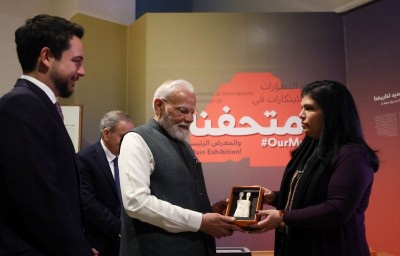Guv rule ends in J&K
"Governor, Mr. N. N. Vohra today issued a Proclamation to revoke the earlier Proclamation, issued by him on 9th January 2015, in exercise
of powers conferred on him under Section 92 of the Constitution of Jammu and Kashmir, whereby he had assumed all the functions of the
Government of the State." read the handout.
The proclamation issued by the Governor brought to an end the period of Governor's Rule in Jammu and Kashmir which had commenced with effect from Jan 8, a Raj Bhavan spokesman said.
Amid a historic political alliance between the People's Democratic Party (PDP) and the Bharatiya Janata Party (BJP), former's supremo Mufti Mohammad Sayeed took oath as the next Chief Minister of Jammu and Kashmir on Sunday at a special ceremony in the presence of Prime Minister Narendra Modi here.
BJP's Nirmal Singh took oath as the state's Deputy Chief Minister.
Twelve leaders each from BJP and PDP also took oath of office and secrecy including Abdul Rahman Bhat, Chandra Prakash, Javed Mustafa Mir, Chaudhri Lal Singh, Bali Bhagat, Sajjad Lone, Chaudhary Zulfiqar Ali, Sukhnandan Kumar, Syed Basharat Ahmad Bukhari, Ghulam Nabi Lone, Syed Mohammad Altaf Bukhari, Haseeb Drabu, Imran Reza Ansari, Tsering Dorjay, Mohammad Ashraf Mir, Sunil Kumar Sharma and Abdul Majeed .
Besides Modi, BJP chief Amit Shah, party veteran LK Advani were also present at the stage along with several union ministers, who attended the ceremony held at Jammu University's General Zorawar Singh Auditorium.
PDP MP Mehbooba Mufti was also seated beside the BJP leaders during the swearing-in ceremony.
Two months after a fractured mandate stood in the way of a government coming to power, People's Democratic Party chief Mehbooba Mufti and BJP president Amit Shah had struck a deal on a Common Minimum Programme towards formation of the government in Jammu and Kashmir.
The deal reached between Mebooba Mufti and Amit Shah ended two months of negotiations between the two parties aimed at narrowing differences over various contentious issues, including the Armed Forces Special Powers Act (AFSPA) and Article 370 of the Indian Constitution.
The electorate of Jammu and Kashmir elected a hung Assembly in December last year with the PDP emerging as the single largest party with 28 seats in the 87-member House.
The BJP emerged as the second largest party with 25 seats followed by the National Conference at 15 and Congress with 12. Smaller parties and independents won seven seats.
(Reporting by Saleem Iqbal Qadri)
Support Our Journalism
We cannot do without you.. your contribution supports unbiased journalism
IBNS is not driven by any ism- not wokeism, not racism, not skewed secularism, not hyper right-wing or left liberal ideals, nor by any hardline religious beliefs or hyper nationalism. We want to serve you good old objective news, as they are. We do not judge or preach. We let people decide for themselves. We only try to present factual and well-sourced news.







